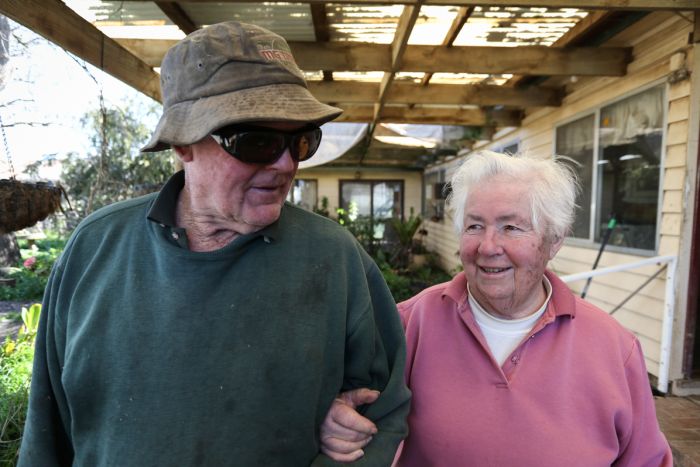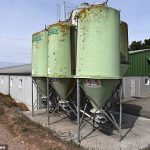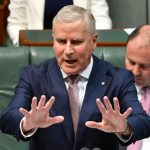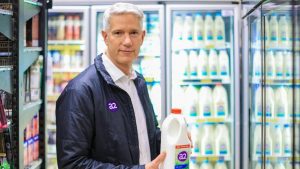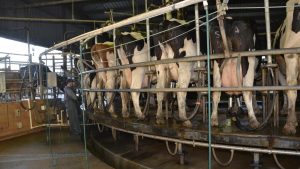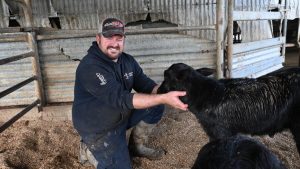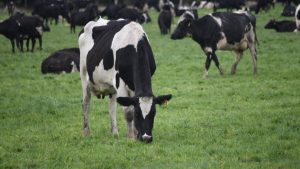
As Diana Gibson shuffles along the dirt driveway of the farm she holds on to her husband’s elbow as he gently cushions her stumbles.
The 82-year-old cannot walk for long and often feels giddy.
A few years ago, Diana was diagnosed with Parkinson’s disease which she describes as “a bastard”.
The progressive neurological condition has not only inhibited her movement but her mind.
“My memory is departing,” Diana said.
When she meanders to another topic or struggles to finish her sentences, 81-year-old Harry Gibson chimes in filling in the story.
The blind octogenarian, who works along his son milking over 300 cows in north-central Victoria in the Goulburn Valley, acknowledged it was hard losing part of his wife but said it was all part of life.
“In previous years she used to get a hold of my elbow and point me in the right direction,” he said.
When walking around the paddock Diana would point out which cow was about to give birth.
“She was my eyes,” he said.
“Now I have to find my direction and she has to hang on to me.”
Vision loss doesn’t keep Harry from his cows
For the past 10 years the fourth-generation Nanneella dairy farmer has been completely blind.
The gradual deterioration of his eyesight began in his early 20s when he struggled to read, yet both were not particularly concerned.
“We didn’t really think about it,” Harry said.
He was eventually diagnosed with retinitis pigmentosa, a rare genetic disease involving the degeneration of the retina leading to blindness.
Over the years Harry adjusted to his diminishing eyesight, refusing to use a white cane and instead occasionally using a poly pipe to tap his way around the property.
“It is frustrating, but the cows are all in their normal places in the dairy so they’re within 6 inches of either way,” he said.
“The teats are where they always were so … you feel the front teats with your finger on the edge of the cup and it seems to work alright.”
When Harry stopped driving cars Diana stepped-in behind the wheel — his link to a life beyond the farm where he had spent his whole life.
“I had to find a girl with a car,” he laughed.
The woman who grew up all over the state because of her father’s work, and eventually travelled the world, would go on to drive the tractors, run the farm, do all the housework, and rear two boys.
“It wasn’t hard,” Diana said.
In the early days the cries of “poor blind Harry and his townie wife” only increased her determination to succeed.
“Which we have,” Harry said.
“I couldn’t have done it without her — I couldn’t have done it by myself.”
‘I didn’t expect her to wear the pants’
It wasn’t love at first sight when Harry met Diana in the doctor’s waiting room in Rochester in central Victoria where she worked as the receptionist.
“I didn’t take much notice,” Diana said.
Both talked about topics that disinterested the other but 10 years later Harry invited Diana to a friend’s wedding and 47 years on they remain as committed as ever.
“There must have been something going on because we kept going out,” Harry said.
“We’ve just worked together, we’ve worked as a team together for nearly 50 years.”
Before they got married they discussed their roles.
“I didn’t expect to wear the pants, but I didn’t expect her to wear them either and it’s worked very well,” Harry said.
He said his father was a very different man, with a firmly held belief that a man’s place was to run the business and a woman’s place was in the kitchen.
“He actually had the audacity to tell Diana that one day,” Harry said.
“My father would have said the same thing,” Diana said.
But together they used to work side-by-side in the dairy.
“He’d have a fit now because we employ mostly girls,” Harry said.
“I don’t believe in [perpetuating] any of this gender inequality.”
A greater understanding of commitment
The key to a successful marriage is tolerance according to Diana.
“He does more than he should. He pulls his weight very well,” she said.
Harry thinks his generation have a greater understanding of commitment.
“With nearly all of our friends the only ones that are single their partners are dead,” he said.
“When we got married we agreed to stay together ’til death do us part.”
Although he is not looking forward to the day when he has to look after Diana completely, he is resigned to it.
“But I’ll have to, I suppose, at some stage if I don’t fall off the twig or something,” Harry said.
He prefers not to look into the future and lives in the moment instead.
“You have to live as things turn up and manage it,” Harry said.
In the next year or two when Diana will be unable to drive they will move into town.
“It’s not going to make my day, but it will have to happen. You just have to be philosophical about it,” Harry said.
